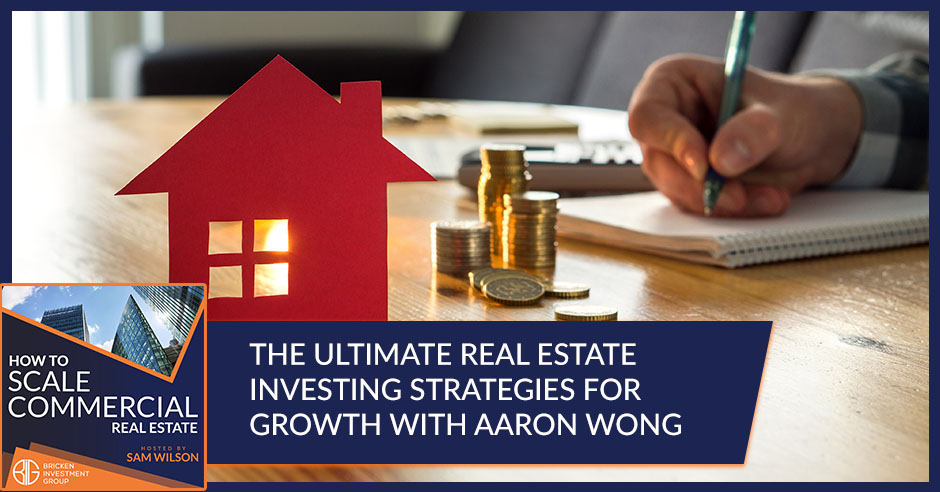Do you know what’s right for you? In the real estate industry, you have a choice and you have to make sure you’re making a decision that would be perfect for you. Utilizing over a decade of investing and entrepreneurial experience, Aaron Wong has developed a strong track record of success. Within real estate, Aaron focuses primarily in multifamily properties through self-ownership, joint ventures, and syndications as both sponsor and limited partner. In this episode, he shares his professional journey and strategies to keep going on with your business venture. He emphasizes that you shouldn’t get emotionally attached to deals. Things happen and nothing is guaranteed.
—
Watch the episode here:
Listen to the podcast here:
The Ultimate Real Estate Investing Strategies For Growth With Aaron Wong
Aaron Wong focuses primarily in multifamily properties through self-ownership, joint ventures, and syndications as both a sponsor and a limited partner. Fun fact about Aaron, he says he’s more of a limited partner than a general partner at least that sounds like that’s the long-term goal. He was recognized by Utah Business magazine as one of the top 40 under 40. Aaron, welcome to the show.
Thanks very much. I appreciate being here.
Did I miss anything there? We said that early on, you said, “I’m more of a limited partner than a long-term general partner.” What does that mean?
I love to be passive. That’s a lot of people’s ultimate goal, but for me, I love investing and being active. I’ve been active since about 2013 in real estate and doing different things. I see this point in my life where I could see that being passive is just more of what I enjoyed doing. Meaning I have that time to do what I want. If I want to be active in a deal, I’ll jump into a deal and be active in it. Mainly just looking at other people’s deals because instead of me having to go find deals, deals are coming to me, and I can look at them. If I like them, I’ll invest in them.
I’ve said that for a long time. I said my ten-year plan is to make enough money in real estate to where I can be 100% passive in real estate.
Everyone should.
There’s nothing like getting your time and money side of the equation freed up for you. There are three questions I ask every guest who comes on the show. Aaron, can you give us the 90-second version of where you started, where you are now, and how you got there?
Passive investing can help you make the time to do what you want.
2013 is where I would consider I started my real estate as this type of active career. I bought houses back in the early 2000s but, 2013 is when I started. In San Francisco, I bought a house out and we pretty much house hacked it and did a live in flip. It was like a 1960s build, 1,200-square feet, pretty small but a huge backyard. We spent about three years rehabbing that thing. When we moved away from San Francisco, we rented it out for a little bit and then we were knocking up against this tax-free investment type where you sell it within a certain amount of time, you can get it for tax-free since we lived in it.
It was a decision of, “Do we hold onto it and continue renting it out as an investment or sell it and then try to do something else with it?” Ultimately, we decided, “Sell it.” We sold it. We feel very fortunate with what we got from it, being San Francisco in 2019. From there, we took the money. I’ve always been an investor, but it was mainly stock investing. I was a little bit into real estate and it wasn’t until that we sold that property, I was like, “I got to do something else with it. I don’t really want to put it on all the stocks.”
My wife has always been pushing me to get into real estate, and more real estate. That’s when I went in and I started hearing something about BiggerPockets. BiggerPockets is the thing if people want to get in real estate. I jumped on there, started listening to webinars, reading a lot of articles and that’s got that fire burning in me to look at, instead of single-family homes, multifamily. We immediately decided, “Let’s go into multifamily.”
Within a month, we bought three properties, two fourplexes, a couple of duplexes in three different states. It went from there and then just kept going. Eventually, I partnered up with a good friend of mine that I have known for about ten years. We picked up a few more properties and then syndicated a 200-unit property. That’s where we’re at, at this point.
I love the go-get-it-done attitude. That’s a lot of inertia right out of the gate like, “We did this.” Not only did you pick up a bunch of duplexes and quadplexes, but you did it in multiple states. How’d you do that?
As you know, Brandon Turner on BiggerPockets makes it sound so easy. We felt like we could do it. My wife was really into it. We decided cashflowing multifamily properties is where we wanted to be. Appreciation is great, but cashflow is what we wanted. At that time, we just looked online like Realtor.com, Trulia, or whatever it was, and popped in fourplexes because that’s what we’re interested in. They popped up and we started pursuing them. The numbers worked according to all those calculators that we ran them through and bought them. Pretty much all of them sight-and-seeing.
I’m assuming then you needed to use local property management to manage those for you.

Real Estate Investing: There are a lot of things, emotional rollercoasters and a lot of things that could happen if you’re not ready for it. It would probably cause a little bit too much stress on certain people.
Yes, a local property management for everything. We don’t manage anything.
It makes a heck of a lot of sense. Let’s talk about your latest acquisition, the 200-unit property. What were some lessons learned in that acquisition?
There’s a lot. We could spend all day talking about the things that we learned. First thing is you got to have good partners because 200 units is a lot to take on and it’s not something that you can do yourself. We were very fortunate to be guided. We felt there were a lot of things that fell into place for us to find the right partners to bring on, one that could do capital raising for us and one that could help us with investor relations. Between my partner and I, we were able to do a lot of the acquisitions asset management side on our own, but bringing on good partners and finding good lending is very important and making sure your numbers are penciled out, and just be ready for every single thing that could possibly happen.
What’s it been like on the capital raise? Especially, a newer syndicator is one of the largest concerns people have going out of the gate is like, “How are we going to raise the equity for that?” What did that look like for you?
We had our little bit of concerns about it. It was a $2.7 million raise. That’s what it was for this 200-unit. My partner and I felt like we could probably raise at least half it ourselves. We’re like, “Where’s this other half going to come from?” It was just talking to every single person you knew about what you’re doing. My partner was very busy traveling, doing a lot of different things. He lives in Utah, he had a Bat Mitzvah to attend in New York and he had just barely gotten home from a business trip. That very next day, he was supposed to lead to this Bat Mitzvah.
He’s just, “I don’t really want to go but I’ll go,” because this is a good friend of his. When he was there, his buddy was telling everybody what he was doing about real estate and then his brother-in-law just happened to be in real estate. They had long conversations and said, “I can help you raise this money because we’re interested. We do syndications as well, but we’ve only been focused in the Northeast. We’d like to go West and you happen to be West.” It was a mutual thing there where it just worked out. They came in and helped us be a KP as well, because they had some experience, but also, primarily helped us with the capital raise. Talking to people about it and just making sure your deal’s a good deal. Making sure those numbers work.
What do you think is the number of conversations you had to get, in this case, $2.7 million, so $1.35 million? How many conversations did you have to get your half of that raise done?
In real estate, you need to have good partners. It’s not something that you can do yourself.
A lot. Hard to say, my partner and I were going after everybody we knew. This one was of friends and family. We couldn’t go out there and just tell the whole world that we’re trying to raise for, so we’re just going after the friends. How I raised our money was I happened to go back to Utah and visit family and friends. I was telling him them I was doing, “I’m in real estate, this is what I’ve been doing. This is the returns that I’m looking at right now.” They’re like, “I want to join. What are you guys doing?” It’s talking to people. I probably talked to about 20 to 30 people, my partner is about the same. You got to realize about half those people end up investing, trying to see if they’re interested. That’s about the stat for us.
That number is lower than what I would have expected to raise. That’s very cool. Was there a natural way that you brought this up in conversation or did you approach it and say, “I want to talk to you about what I’m doing?”
We’re going back to Utah, we don’t see our friends very often so, we just have to go back and talk to them about what we’re doing. I was asking them what they’re doing, being interested in them. They would say, “What are you up to?” I would say, “Into real estate and this is what we’re doing.” Showing them what we’re doing and some of the past results that we’ve had in our other deals, that got them interested through those conversations.
Where are these 200 units now? What state is that located in?
It’s in Oklahoma.
Can you tell us about your market? How did you guys end up selecting that market?
We started off in Ohio. That was our main focus of where we wanted to go. My partner, he’s the acquisitions guy. We wanted to focus in that Midwest area and we felt like Ohio was getting too expensive as far as what we were trying to buy. We started expanding a little bit further. We went a little further South, that’s how we ended up in Memphis for a quick second. We ended up in Alabama and then eventually Oklahoma, just building teams. We were talking to people, trying to find out what people were trying to do. Eventually, he met some brokers that seemed pretty good.

Real Estate Investing: If large multi-families for you, maybe you smaller multifamily or some other asset class really, think about those things before you pursue those.
He found a deal on Crexi and then we eventually got this 56-unit property. That was listed, got to the broker, and we got it under contract. Before we flew out there, I was in charge of the operations asset management side. I was trying to hook up with some property managers. Before we went out there, we talked to a couple of property managers and one property managers say, “There’s a 200-unit out in the same city. There’s a lot in Oklahoma.” Where this 56 unit is, he says, “I hear it might be going on market soon. You should go check it out.” I was like, “Okay.”
We went out there to do our site walkthrough of this 56-unit. We walked to that property and then eventually we went over to that property as well, because we came to find out later on that 56-unit and the 200-unit, the owner of the 56-unit was a minority partner at the 200-unit. There was a little bit of a relationship there. We got to get down to the 200-unit. We just walked the outside of the property, the property manager was not allowing us to look at any units at the time, but it looked clean and nice. The 56-unit eventually didn’t work out because the seller just wanted too much because there’s a lot more work than what would be expected and they weren’t willing to negotiate.
We’re like, “Unfortunately, we can’t go after that property because it’s not going to work. It’s not going to pencil.” From there, we’re like, “Let’s go after the 200 then.” We found out who the listing broker was going to be for the 200 and the primary owners of the property actually live in Utah, not far from where my partner lived. That actually worked out too, because he was able to reach out to the owners there. We were able to get it under contract through that relationship.
I love how one deal can lead to the next. If you’re not active, if you’re not out actually doing the work, you’re just not going to find those additional opportunities. It’s part of getting in the reps that leads you to success. Well done on that. I’ve learned a lot from you, Aaron. I love the progress you’ve made, how quickly you’ve made it.
There’s a lot of people that are still working really hard to get that many units under their belt and to have acquired this many smaller properties and then taken down a large one, in such a short timeframe, that’s pretty impressive. Is there anything else you’d love to share with our readers about your journey that you think would be helpful to somebody that is just starting out or does scaling into bigger assets?
I would tell people to think about what they’re getting themselves into. Multifamily, a large multifamily, is it really something that you should do? It’s not for everybody. It’s definitely not for the faint of heart, because there are emotional rollercoasters and a lot of things that could happen if you’re not ready for it. It would probably cause a little bit too much stress on certain people. It was a stressful time, this 200-unit that we went into that we finally got. Think about it and know if large multifamilies for you, maybe smaller multifamily or other asset class. Think about those things before you pursue those.
Let’s jump into the Final Four questions. The first one is this, what is one tool or resource you find you can’t live without?
Don’t get emotionally attached to your deals.
I have to have my calendar and my to-do list. That is very important to me. I live off my calendar and my to-do list every single day, every morning, every night. I’m looking at those to-do lists, prepping for the next day. I tell my wife if I have a party or something we have to go to, I say, “Put it on my calendar or else I’ll forget it.”
It’s amazing how reliant we’ve become. Is there an integration between the calendar and the to-do list that you use or is it off of a certain platform?
No, it’s just a basic calendar like on Google or Outlook. I just have to see it.
The second question is this, if you could help our listeners avoid just one mistake in real estate, what would it be and how would you avoid it?
Don’t get emotionally attached to your deals. It’s so easy to get emotionally attached because you’re going to spend hundreds of hours looking for a deal and all of a sudden, you find one and you really want it so bad that you get emotionally attached to it. You make bad decisions and that can happen and I’ve seen it happen.
Third question is this, when it comes to investing in the world, what’s one thing you’re doing right now to make the world a better place?
I thought a lot about this one. We got into investing when my partner and I came together, we really wanted to make the world a better place. That is our mantra. What we put down on our values is trying to make the communities better. All the properties that we have, we are there to improve them and make them nicer. Even though we may not make as much money, but we want to make them nice and comfortable for people because everyone needs a nice place to live. It doesn’t matter, it can be A, B or C class, or D class, whatever it is. People still need a nice place to stay. They’re still people at the end of the day. These are still human beings that need to be treated with dignity and respect.

Real Estate Investing: It’s so easy to get emotionally attached because you’re going to spend hundreds of hours looking for a deal and all of a sudden you find one and you really want it so bad that you get emotionally attached to it.
Aaron, if the readers want to get in touch with you or learn more about you, what is the best way to do that?
I’ve mentioned before that we’re going through a little bit of a transition phase, but the best place to reach me right now is you can hit me on Instagram, which is @TheRecoveringPassiveInvestor. You can hit me up there and then we can reach out. We’ve got some articles about multifamily investing for passive investors. Reach out to me and I’m happy to connect and talk anytime.
Thank you, Aaron. I appreciate your time.
Thank you very much. I appreciate it.
Important Links:
- Aaron Wong
- BiggerPockets
- Realtor.com
- @TheRecoveringPassiveInvestor – Instagram
- https://www.LinkedIn.com/in/awong168/
About Aaron Wong
 Utilizing over a decade of investing and entrepreneurial experience, Aaron has developed a strong track record of success. Within real estate, Aaron focuses primarily in multifamily properties through self-ownership, joint ventures, and syndications as both sponsor and limited partner.
Utilizing over a decade of investing and entrepreneurial experience, Aaron has developed a strong track record of success. Within real estate, Aaron focuses primarily in multifamily properties through self-ownership, joint ventures, and syndications as both sponsor and limited partner.
He was recognized by Utah BusinessQ Magazine as one of the top 40 under 40 while a business startup he founded was acknowledged by the same publication as The Best Kept Secret for his leadership. Aaron graduated from the University of Utah with dual bachelor’s degrees in Chinese and Asian Studies along with a Master of Business Administration. Aaron also has a master’s degree in Management with additional certificates in change management, organizational leadership, and project management from Colorado Technical University. In his spare time, Aaron enjoys spending time with his family, playing sports, and scuba diving.




0 Comments